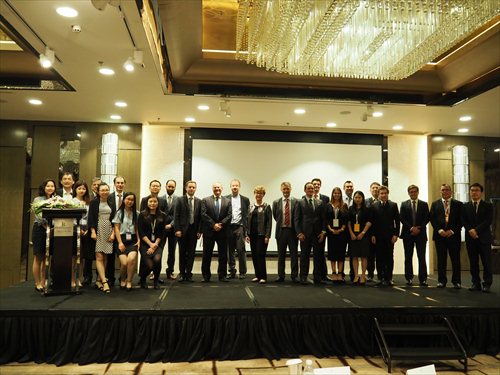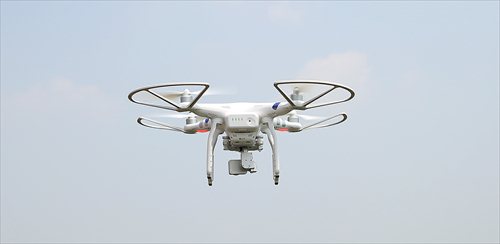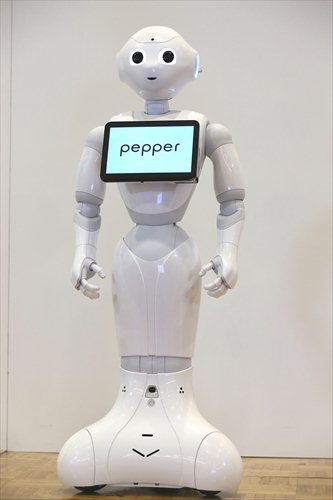Lex de futuro, Mr Roboto
International seminar looks into legal issues of robotics
Yang Jun was the only man who didn't wear a tie to a seminar on robot law last Thursday, and that was when he was the opening speaker. "I believe when we are discussing a topic that involves so much innovation, we shouldn't be tied up," Yang, managing partner of a local law firm, said.
More than 20 members of Lexing, an international network of legal professionals focused on digital and emerging technology law with a focus on robotics, joined Yang in the full-day seminar.
Coming from more than 20 jurisdictions, they presented and exchanged views on issues including smart factories, artificial intelligence and privacy and data-protection laws.
Alain Bensoussan, a French lawyer who founded Lexing, in his keynote speech immediately pointed out how broad the definition of robots is. Drones and autonomous cars, for example, fit into the category too.

Attendees at the seminar on robot law Photos: Courtesy of Jade & Fountain PRC Lawyers and CFP
The future is now
Yang said that these sectoral robotic services are not as distant from us as many might believe.
"The so-called smart cars will come out in two or three years. The drones are used widely. As the society further ages, domestic robots will spread.
"Many legal professionals think this is something about the 'future world,' but I believe we are in fact close to that future. We need to think about legal issues now, for it will be too late to wait till problems occur," Yang told the Global Times.
Yang, who has been with Lexing for a few years, said the international members started their research on robot law years ahead of their Chinese counterparts, and he introduced them to offer some new thoughts and inspirations.

Three frameworks
Throughout the seminar, Lexing members looked into different aspects of robot law within the legal frameworks of the law for human beings, ethical and cultural frameworks, and property law.
Gabriel Lizama Oliger, from Costa Rica, touched upon how his country regulates robots in the health sector, which he said will be particularly relevant to China as the country's dependence on these robots grows.
Medical robots in Costa Rica are classified into four categories according to their risks, and cannot be used without complying with the essential requirements concerning the safety and health of patients, users and third parties.

Not so autonomous?
The most heatedly discussed topic at the seminar was on autonomous cars, which was presented by Sebastien Fanti, a lawyer from Switzerland, and Joao Pedro Alves Pereira, a lawyer from Portugal.
Fanti reviewed an international legal framework - the Vienna Convention on Road Traffic - and the Swiss legal framework to conclude that the regulations must be amended now to allow the deployment of autonomous cars globally, and that the regulatory restrictions ought to be taken care of later and according to each national law.
"However, there is a concern that each country - and especially those that host manufacturers' headquarters - will take some steps in order to safeguard their economy and benefits. That would compromise the standardization of the legal apprehension of the problems," Fanti warned.
Moreover, he believed car manufacturers will face a moral and algorithmic dilemma, or equation of death.
Big questions include how the car should be programmed to act in the event of an unavoidable accident. What if the car has to choose between desperate measures involving life and death, with different possible outcomes?
Inevitable risk
A number of legal professionals and law students from Shanghai attended the seminar. Among them was Huseyin Ozturk, a Turkish postgraduate law student at Fudan University.
"Talking about robot law, something that doesn't really exist systematically in legislation yet, it might seem abstract. But it's a path that must be taken before we arrive at it," Ozturk told the Global Times during the seminar's break.
He said that developing robot technology and its legal risks are inevitable, and greatest among them revolves around the possibility of artificial intelligence exceeding human intelligence.
"It is even a problem today to define a robot, so imagine how hard it will be to define the legal responsibility of a robot possibly with more intelligence than humans, while it has no 'free will,'" Ozturk said.
But how will the discussions and ideas of this seminar influence the country's legislation and regulation on robots?
For Yang, the seminar is "purely academic." "I believe it is robot manufacturers who are to push the legislation," he said, a view that Fanti might oppose.